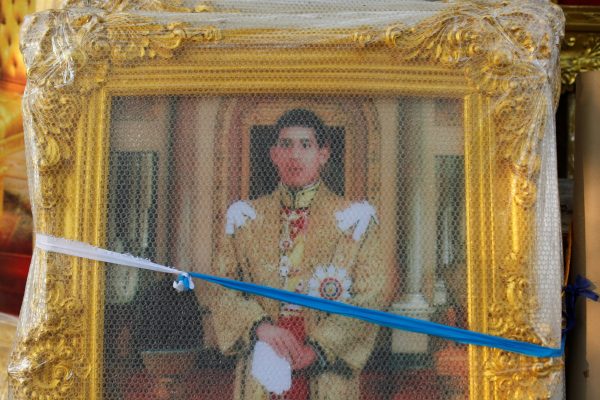In the past months, Vajiralongkorn has vigorously intervened in the political domain. He ordered the amendment of the constitution to increase his power and to more easily facilitate his frequent visits overseas. The junta enthusiastically granted Vajiralongkorn’s wishes, and saw an opportunity to exploit the monarchy for its own political advantage.
The new king spends most of his time in the outskirts of Munich. Yearning for a quiet life in Germany, Vajiralongkorn soon discovered the aggression and intrusion of the European media. He has been constantly hounded by the paparazzi. On at least two occasions, images of him and his mistress in skinny tank tops revealing massive fake tattoos on their bodies emerged on the internet and appeared on the cover of a German tabloid.
These photos and video clips undoubtedly damaged the reputation of the newly crowned monarch and shook the political stance of the junta. It prompted the military government to introduce drastic solutions to stop the proliferation of the video clip and photos — threatening to block access to Facebook in Thailand and banning prominent critics of the monarchy.
Accordingly, the Ministry of Digital Economy and Society issued an order in April this year prohibiting Thais from contacting three critics of the monarchy — historian Somsak Jeamteerasakul, ex-journalist Andrew MacGregor Marshall and me. Thais were told not to befriend or follow us on Facebook, as well as not to click ‘Like’ or share our content online. Those violating the order could be charged with lese majeste, a crime of injury to royalty punishable by 3 to 15 years in prison.
Shortly after the issuance of the order on 3 May, six Thais were arrested and charged with lese majeste. Among them were university professor Saran Samantarat and well-known lawyer Prawet Prapanukul. The lese majeste law, as defined by Article 112 of the Criminal Code, has consistently been employed to attack enemies of the royal institution. This pattern of repression over the years has become normalised as a vicious device used to undermine opponents.
But overusing the law could be counterproductive to the military government and the monarchy itself. The sharp increase in lese majeste cases indicates that the law might have lost its royal magic. It also suggests the rise of anti-monarchy sentiment among some Thais. More than 100 Thais are currently doing jail time on lese majeste charges.
Vajiralongkorn has been on the throne for only 6 months, but his short reign has already seen the highest numbers of lese majeste cases and the harshest punishment against violators of this law. Two weeks ago, a Thai court delivered a 70-year sentence to a Thai man accused of making a fake Facebook page and repeatedly offending the monarchy. He admitted his guilt and his sentence was reduced to 35 years.
The junta is relentlessly searching for ways to intimidate the public regarding any negative comments about the new king. Cyberspace has since become a primary battlefield, with the monarchy and the junta both hoping to win the war using the lese majeste law as their desperate weapon.
Of course, they are bound to lose. Under King Bhumibol, lese majeste was used in a limited manner, at least prior to the 2006 coup that overthrew Thaksin Shinawatra. After 2006, the use of lese majeste was more widespread, visibly becoming a political instrument against critics of the monarchy.
Bhumibol was highly revered. He was charismatic, divine and enjoyed moral authority. Royalists exploited those qualities of Bhumibol to justify cases of lese majeste and harsh punishments against violators.
But Vajiralongkorn is not Bhumibol. Vajiralongkorn’s lack of charisma, divinity and moral authority makes the lese majeste law less authoritative. As the new king behaves badly, the law becomes less sacred.
The military and royalists have arrived at a political deadlock. They are stuck with Vajiralongkorn. In the short term, there might be some attempts on the King’s part to construct a new public image, for example through a campaign like ‘Bike for Mom’. But such images of a supposedly engaging monarch stand in stark contrast with other darker portrayals of Vajiralongkorn — as a king inclined toward violence, an eccentric lifestyle and erratic moods.
It is too late for the palace to remake Vajiralongkorn’s personality. It is too late for the military and the royalists to refrain from using the lese majeste law to defend the status of the monarchy. And it is too late to prevent Thais from talking openly about their king today.
Pavin Chachavalpongpun is Associate Professor at the Center for Southeast Asian Studies, Kyoto University.

